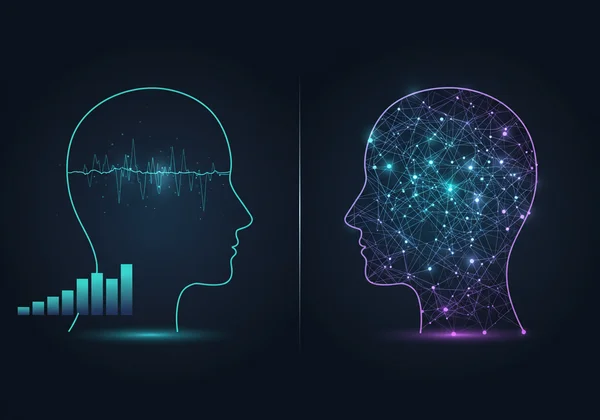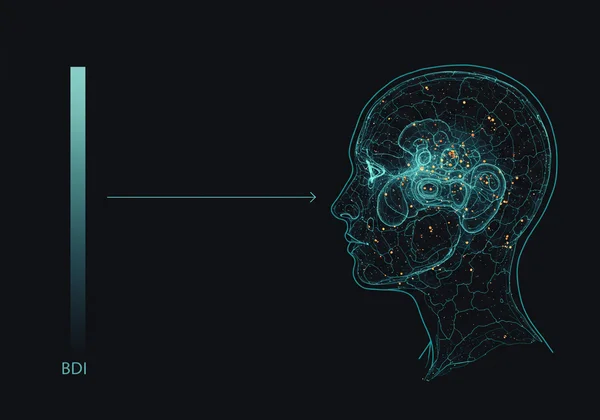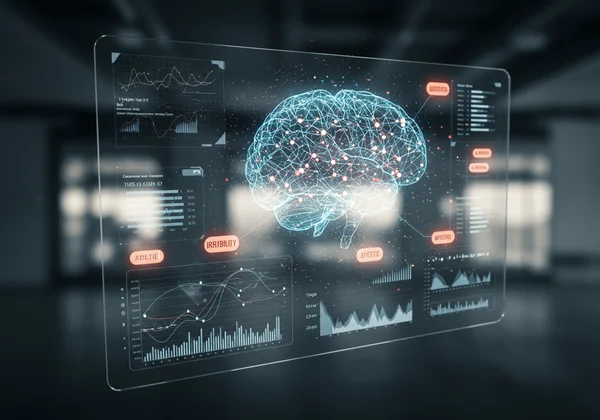AI BDI Report: Personalized Insights Beyond Your BDI Score
August 10, 2025 | By Beatrice Holloway
Understanding your emotional well-being goes deeper than just a number. While a standard Beck Depression Inventory (BDI) score is a helpful start, imagine a tool that could explore your responses even further, gaining insights made just for you. This article explores how our optional AI BDI report can transform your self-assessment, offering new clarity. Why is personalized depression insight valuable for my well-being? It's about moving from a simple what to a meaningful why, empowering you with a richer understanding of your emotional landscape.

For years, the BDI test has been a cornerstone of mental health screening, but technology now allows us to enhance this proven method. We'll break down how AI technology elevates the classic BDI depression test into a powerful tool for self-discovery. If you're ready to see what lies beyond the numbers, you can start your free BDI test anytime.
The Evolution of BDI Test Interpretation
Understanding your mood is a journey, and the BDI test is a fantastic starting point. For decades, clinicians and individuals have relied on its scoring system to gauge the severity of depressive symptoms. However, as our understanding of mental health and technology has grown, so has our ability to interpret these results with greater nuance. This evolution is key to transforming data into genuine self-awareness.
Standard BDI Scoring: Understanding the Basics
The traditional Beck Depression Inventory (BDI) test culminates in a numerical score, typically ranging from 0 to 63. This score is calculated by summing the values of your responses to 21 questions about your feelings over the past week. The BDI score meaning is categorized into levels, such as minimal, mild, moderate, or severe depression. For example, a score in the BDI mild moderate severe range provides a quick snapshot of your current state.
This method is scientifically validated and incredibly useful for a rapid preliminary assessment. It answers the question, "What is the intensity of my symptoms?" But it doesn't always answer, "What specific patterns are driving these feelings?" This is where a more profound analysis becomes essential for meaningful insight.
Why Deeper Analysis Matters for Depression Insight
A single score, while informative, can feel one-dimensional. Two people could have the exact same BDI score but be experiencing their emotional challenges in vastly different ways. One person might score highly on questions related to fatigue and loss of pleasure, while another's score might be driven by feelings of guilt and self-criticism. This is why BDI deeper analysis is so crucial.
Understanding these underlying patterns is the key to effective self-reflection and, if necessary, seeking the right kind of support. It's the difference between knowing you have a fever and knowing what's causing it. By looking beyond the score, you gain a more detailed map of your emotional state, which is far more actionable.

How AI Elevates Your BDI Insights
Here's where AI truly makes a difference. It helps us go beyond basic scores, offering a deeper dive into your mental health insights. Our system is designed to analyze your unique set of responses, identifying subtle connections and themes that a numerical total would miss. It’s an approach that respects the complexity of human emotion and provides a true AI mental health assessment.
The goal isn't to replace the validated BDI but to augment it, providing a richer, more personalized layer of understanding. Think of it as upgrading from a standard map to a high-resolution satellite image of your emotional world. This powerful tool is available after you complete our confidential BDI test.
Unpacking Response Patterns with AI
Our AI is smart enough to spot hidden patterns across the 21 questions. It doesn't just add up numbers; it examines the relationships between your answers. For instance, the AI might detect a strong correlation between your responses about sleep disturbance, irritability, and changes in appetite. This cluster of symptoms could point to a specific manifestation of low mood that is valuable to understand.
This sophisticated pattern recognition goes beyond the standard clinical use of BDI, offering insights that were previously only available through extensive one-on-one analysis. It helps highlight the interconnectedness of your feelings, providing a more holistic view of your well-being.

Identifying Nuances in Your Emotional State
Personalization is at the heart of our AI report. The insights you receive are not generic; they are generated based on your specific answers. The report can help you interpret BDI-II scores in the context of your own life. It might highlight that while your overall score is moderate, feelings of hopelessness are a particularly strong theme for you.
Understanding these details can be incredibly empowering. It helps you pinpoint the exact areas that may need more attention, whether through self-care practices, lifestyle adjustments, or discussions with a mental health professional. It turns a general score into a personalized guide for reflection and action.
AI's Role in Self-Assessment, Not Diagnosis
It is absolutely crucial to understand the role and limitations of this technology. The AI-driven report is a powerful self-assessment and screening tool, but it is not a substitute for a professional medical diagnosis. No online test or AI can diagnose depression; that is a process that requires a comprehensive evaluation by a qualified healthcare provider.
Think of our AI report as an advanced tool to help you gather information and prepare for a more productive conversation with a doctor or therapist. It provides a structured, insightful starting point for deeper exploration. Our platform is designed to support your journey, and you can always take the test online to begin that process.

Actionable Wisdom: What Your AI Report Reveals
The goal of the AI-enhanced BDI report is to provide you with wisdom you can act on. It’s not just about showing you data; it's about translating that data into practical understanding that can guide your next steps toward better emotional well-being.
Practical Steps After Your Personalized Report
Your personalized report doesn't leave you with just data. It helps contextualize your BDI test results by identifying key themes. For instance, if the report highlights "Anhedonia" (loss of pleasure), it might prompt you to consciously re-engage with hobbies you once enjoyed. If it points to "Self-Criticism," you could explore mindfulness or self-compassion exercises.
The report serves as a launchpad for targeted self-reflection. It gives you specific areas to focus on, making the idea of "working on your mental health" less abstract and more concrete. The journey starts with clear understanding, which you can gain when you discover your results.
When to Seek Professional Guidance
Our platform consistently emphasizes that a self-assessment is a first step, not a final answer. The AI report is designed to help you decide when and how to seek professional guidance. If your results, especially the nuanced insights from the AI, indicate moderate to severe symptoms or significant distress, this is a strong signal to consult a professional.
You can even use the report as a discussion tool with your doctor. Sharing the identified patterns can help them understand your situation more quickly and thoroughly, leading to a more effective care plan. Taking charge of your mental health begins with awareness, so we encourage you to start your self-assessment today.
Your Path to Deeper Self-Understanding
Your emotional well-being is not a simple number. While a traditional BDI score offers a valuable snapshot, our optional AI-driven report provides the full, detailed picture. It transforms your self-assessment from a score into a story—your story. By uncovering response patterns and highlighting personal nuances, it provides actionable insights that empower you to take meaningful steps forward.
This journey of self-exploration is about making life richer and understanding yourself better. We invite you to experience the clarity that our advanced tool can provide.
Curious to see what your personalized insights reveal? Start your free BDI test today and take the first step towards a richer understanding of your emotional well-being.
Frequently Asked Questions About AI BDI Reports
How does the AI BDI report differ from standard scores?
A standard score from a free BDI test gives you a single number representing the overall severity of your symptoms. Our AI BDI report goes further by analyzing the patterns among your 21 answers. It identifies underlying themes (like fatigue, self-criticism, or social withdrawal) to give you a more nuanced, multidimensional view of your emotional state, explaining the "why" behind your score.
Can the AI report diagnose depression?
No, absolutely not. This is a critical point. The AI report, like the BDI test itself, is a screening tool for self-assessment and informational purposes only. It is not a medical diagnosis. A formal diagnosis of depression can only be made by a qualified healthcare professional after a comprehensive evaluation. Our tool is designed to empower you with information to support that process.
Is my data private when using the AI BDI report?
Yes. We are committed to your privacy and confidentiality. As outlined in our privacy policy, your individual responses and report results are handled securely and are not shared. The process is designed to be a safe space for personal exploration. You can confidently use our BDI test online knowing your data is protected.
Why is personalized depression insight valuable for my well-being?
Personalized insight is valuable because it’s actionable. A generic score can feel impersonal, but knowing that your specific challenges are linked to, for example, feelings of failure allows you to address that theme directly. This targeted self-awareness helps you make more effective choices for self-care, track your progress more meaningfully, and have more productive conversations with support systems or professionals.